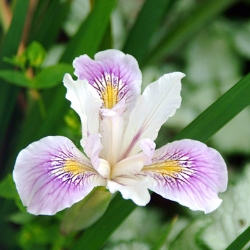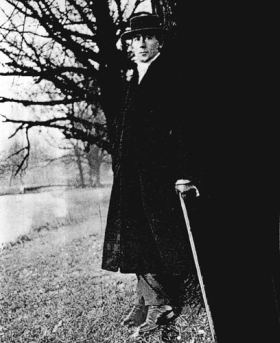|
Hugo Ball
Cimio
A red sky from Bucharest to Paris:
Your body is full of black eyes all over.
We place the hands together like a large fan, when we love each
other.
Your appendix is sick, which makes you very yellow.
Lilac bouquets grow from your ears.
Your whole head is full of lilacs. You are harnessed with lilacs.
Your eyelashes quiver and beat like butterfly wings.
Your nose is very similar to a piano key.
You have dancing hands, little daughter.
Your narrow hips move when you flutter at my side,
Gently conditioned against the wind. You love the large glowing women.
In your smile Apache songs babble.
In Constanza your ears howled the sea.
Your fingers jab like daggers jangling glissandos into the air.
Your tongue is the red head of a snake, burning wick of a lamp.
From your shadow, Cimio, the small devil tumbles
Like a flapping fish poured from the tank onto dry land.
The Sun
Between my eyelids a baby carriage travels.
Between my eyelids a man walks with a poodle.
A group of trees turns into a pack of snakes and hisses into the sky.
A stone gives a speech. Trees in green fire. Fleeing island.
Swaying and shell-tinkling and fish head as if on the ocean floor.
My legs stretch out to the horizon. A coach bangs
Over them. My boots rise up to the horizon like the towers
Of a sinking city. I am the giant Goliath. I digest goat cheese.
I am a mammoth’s little calf. Green grass hedgehogs sniff me.
Grass stretches into sabers and bridges and rainbows over my belly.
My ears are giant pink shells, open wide. My body swells
With the sounds imprisoned there. I hear the bleating
Of great Pan. I hear the vermillion music of the sun. It stands up,
Above to the left. Vermillion, its tatters spray out into the world’s night.
When it falls down, it will crush the city and the church towers
And all the front yards full of crocus and hyacinths, and will blare a sound
Like the tin of a child’s trumpet.
But in the air there is a counter-breeze of crimson and egg-yellow
And bottle-green: swings, which an orange first holds on long strings,
And there is a singing from bird throats that hop over branches.
A very fragile assembly of children’s banners.
Tomorrow the sun will be loaded on a giant-wheeled wagon
And driven to Caspari’s art shop. A brute-headed black man
With a bulging neck, swollen nose and broad step will hold fifty white
Itchy donkeys that in front of the wagon are strained with the building of the pyramids.
A crowd of blood-colored people will accumulate:
Mid-wives and wet nurses,
Invalids in elevators, a stalking crane, two St. Vitus dancers,
A gentleman with a ribbed silk tie and a red-smelling policeman.
I can’t stop myself: I am full of blessedness. The window frames
Burst. A governess hangs up to her navel from a window.
I cannot help myself. The cathedrals burst with organ fugues. I want
To create a new sun. I want to strike the two together
Like cymbals, and to hold out my hand to my lady. We will float
away
In a violet sedan over the roofs of your
Pale yellow city on the passing wind like lampshades made of tissue paper.
Trifle
Before my window,
In the sunshine
Sit little angels.
One, two, three little angels
And look inside.
They breath on the pane
And snicker to themselves,
And write
Your name.
And snicker to themselves
And rub it out.
And wink altogether wickedly
And playfully inside,
And away
The three little angels flutter.
Dance of Death 1916
So we die, so we die,
We die every day,
Since it can be so comfortable to die.
Mornings still in sleep and dream
Midday already there.
Evenings already lowest within the grave.
The battle is our house of pleasure.
Our sun is made of blood.
Death is our sign and password.
We abandon child and wife –
Why are they our concern?
If one could only
Abandon us.
So we’re murders, so we’re murders.
We murder our comrades every day
In the dance of death.
Brother strain on before me,
Brother, your chest!
Brother, you who must fall and die.
We don’t grumble, we don’t snarl.
We are silent every day,
Until the hipbone wrenches from the joint.
Our encampment is hard,
Our bread dry.
Dear God bloody and befouled.
Legend
Before a clear picture of the Virgin Mary
A beggar played the violin.
The birds sang in the autumn field,
The day already ran short.
He played the vines sweet burden,
That he raised up to the stars,
He played the ripe apple boughs
And the mountains’ snowy ice.
He played the light of blue seas
Which shown from his eyes.
He sang with the violin and yet did not
Want the song to be good.
Then he sang the sun and the moon
So that he could give everything away
And cried the lonely peace of the forest
Which would saturate his violin.
He sang and played and hardly noticed
How Mary quietly moved
And by the play of his hands
Put foam on the blowing curls.
He turned back and forth with the play,
The sounding wood under chin.
He wanted his sweet story
To melt away on all four winds.
Then the Madonna climbed down
And followed upon his way.
They went uphill and downhill
And through undergrowth and fences of thorns.
As the rooster crowed he played on
And some strings snapped.
On three he played the Trinity,
On two the tongues of angels.
Yet in the end it was the secret song
Of the native son.
Mary covered him with her robe
In which he slept to his eternal reward.
Epitaph
The good man, whom we carry to the grave,
Looks waxen and seems stiff to us.
But he was so enamored with all light
That one must be wary of calling him dead.
Under all circumstances he loved
To lend an ear to the outrageous.
So surrounded by one hundred tale-spinners
One can only hesitantly dare to believe him.
Therefore, if his narrow mask-mouth
Remains closed and doesn’t want to speak anymore:
Maybe he only listens to the Creator’s reason…
And then rises again like each day.
Leave him confidently at his funeral-play.
Already he’s smiling and we're hardly at the destination.
From 7 schizophrenic Sonnets
4. The Village Dadaist
In beaked shoes and a string corset
He has survived the winter
As a contortionist in the devil’s cabinet
Giving a guest performance next to suburban amateurs.
Now spring appears again
And Mother Nature boldly promenades,
Has him first peevish then eventually
Disgusted with the rag- and dummy-world.
He has crafted a lute
Made of crate-wood and long bolts,
The strings rattle and the voice wails,
But he doesn’t let the illusion be stolen.
He roars and hoots as if he hangs on a spear.
He wheels joyfully tipping his bridal top-hat.
As the king of cowbells he dances on the meadow
To the summersaults of fools and children.
© Jim Doss
|

